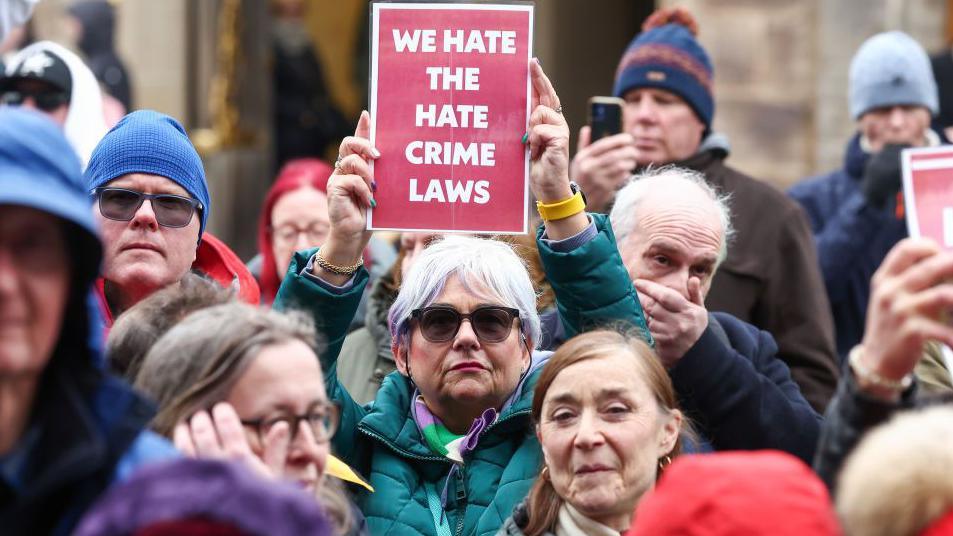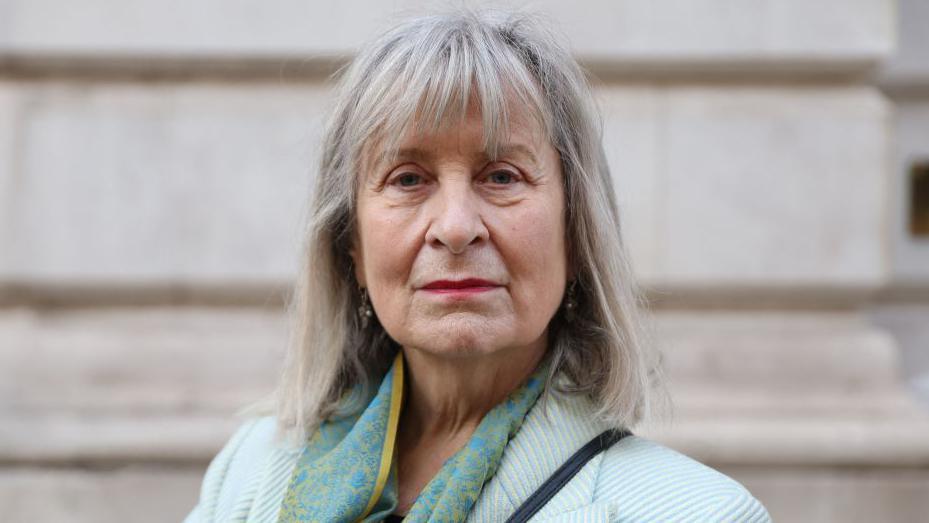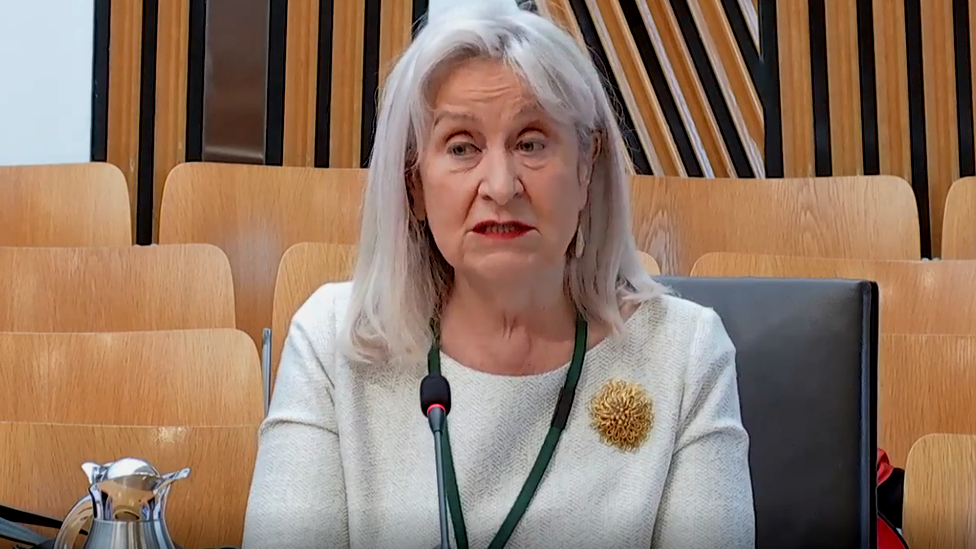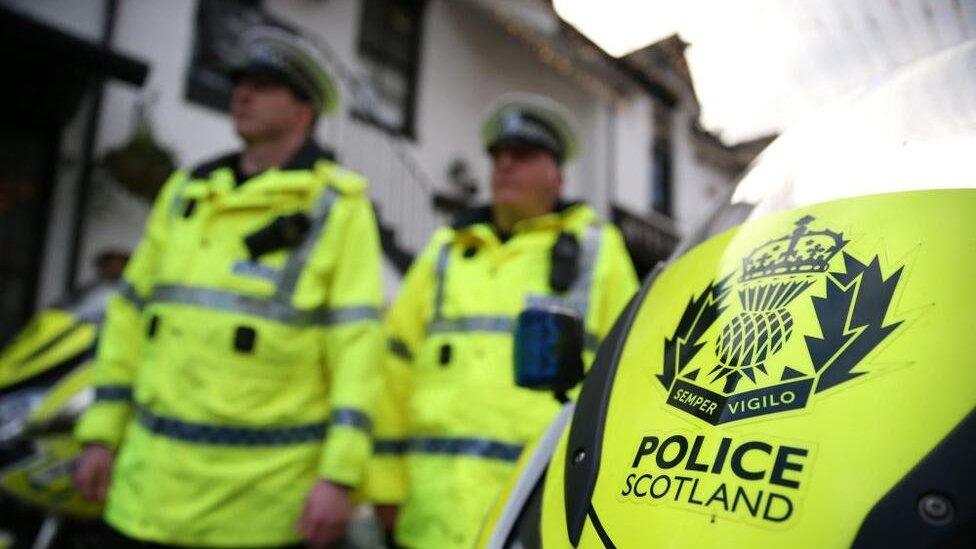Why are women not protected by new hate crime law?

Protesters demonstrate outside the Scottish Parliament as Scotland’s Hate Crime Law came into force
- Published
Scotland has introduced a new hate crime law which seeks to protect various categories of people from hatred and prejudice.
Transgender identity is included as a protected characteristic in the legislation., external
However biological sex is not, to the dismay of some campaigners for women's rights, including the Harry Potter author JK Rowling.
She recently wrote on X that "women gain no additional protections, of course."
Could biological sex have been included in the hate crime law?
Yes. The Hate Crime and Public Order (Scotland) Act 2021 was created in response to recommendations contained in an independent review of hate crime laws, external conducted by a senior judge, Lord Bracadale.
The law updates, and to a certain extent extends, protection from hatred and prejudice relating to age, disability, religion, sexual orientation, transgender identity and being intersex.
Race, colour, nationality and ethnicity are included too.
Hate crimes in Scotland: What’s the new law all about?
Lord Bracadale recommended that women as a group should also be protected in law, although in his report he used the term gender rather than sex or biological sex.
"I am persuaded that there are patterns of offending which relate particularly to the victim’s gender and which should be addressed through legislation which might be seen as falling under the hate crime umbrella," wrote the judge.
Elsewhere in his report, he expressed "some concern" that an approach which focused only on hostility towards women, rather than hostility based on gender, would risk stereotyping all men as perpetrators and all women as victims.
Why are women as a group not included in the new law?
In the end, the Scottish government decided to consider a separate approach to protecting women, writing into the hate crime law, which was passed by the Scottish Parliament in 2021, that sex could be added at a later date.
That happened amid a noisy public debate over the definition of the word "woman" and the law relating to changing gender.
But the SNP-led Scottish government has now said it does not plan to add sex to this legislation, which deals with the crime of stirring up hatred, and offences aggravated by prejudice.
Will women be protected from hatred in another way?
"Women, like everyone else, are already protected from threatening or abusive behaviour in law," said a Scottish government spokesperson.
They added that ministers were planning to go further, by introducing a bill to tackle misogyny which would be "the first of its kind in the world".
The law, said the spokesperson, would "create a new focus on protecting women and girls to address criminal behaviour motivated purely by misogyny."

Author JK Rowling has criticised the new hate crime laws
The proposal comes after the Scottish government commissioned a report, external from the human rights lawyer and Labour peer, Baroness Helena Kennedy KC.
It concluded: "We do not recommend the addition of sex as a characteristic to the [Hate Crime Act] as we feel that misogyny is so deeply rooted in our patriarchal ecosystem that it requires a more fundamental set of responses."
Instead, Baroness Kennedy recommended the creation of a separate law to tackle "the spectrum of misogynistic conduct".
She wrote: "While not all misogynistic behaviours will be captured...the shift in thinking and the reappraisal of certain forms of speech and conduct will contribute to a resetting of cultural norms.
“This Act will also depart from the established practice of having law that is neutral with regard to gender.
"We feel that to eradicate misogynistic crimes these laws have to be targeted at protecting women. Treating as equal those who are not yet equal only furthers inequality.”
What is misogyny?

Baroness Helena Kennedy was tasked with looking at misogyny in Scotland and said she was "shocked" by the evidence she heard
This is a matter of debate but Baroness Kennedy's definition is "prejudice, malice and/or contempt for women".
She said: "Sadly, it is rife in our society. Literalists cling to the word's origins and insist that misogyny means hatred of women, but it means more than that.
“Misogyny is a way of thinking that upholds the primary status of men and a sense of male entitlement, while subordinating women and limiting their power and freedom.
"Conduct based on this thinking can include a range of abusive and controlling behaviours including rape, sexual offences, harassment and bullying, and domestic abuse.”
What would the new law contain?
The Scottish government proposes to legislate for five separate offences in the new Misogyny Act. These are:
a new statutory aggravation relating to misogynistic conduct where a crime such as assault, criminal damage/vandalism or threatening or abusive behaviour is aggravated by misogyny
a new offence of stirring up hatred against women and girls
a new offence of misogynistic harassment
a new offence of misogynistic behaviour
a new offence of issuing threats of, or invoking, rape or sexual assault or disfigurement of women and girls online and offline
Some of the behaviour which would be covered by the law is already criminalised in Scotland, as Baroness Kennedy points out.
She said: "Significant efforts have been made to improve the law concerning rape, other sexual offences and domestic abuse, in order to achieve justice for women.
"Unfortunately, many potentially protective laws are hidden away in myriad pieces of legislation and some behaviours are so normalised that law enforcement officials fail to act."
When will Scotland’s new misogyny law be introduced?
The Scottish government said it has already consulted on a draft bill.
It added the responses received will inform the bill it will introduce into parliament "in due course to begin the legislative process".
Ministers have promised to do so during this parliamentary term, which ends in May 2026.
Related topics
- Published27 April 2022

- Published1 April 2024

- Published2 April 2024
